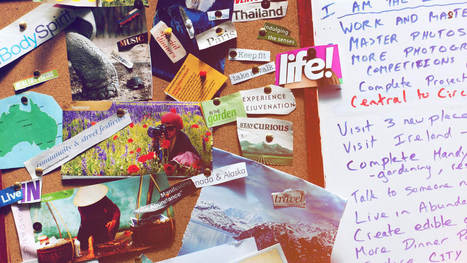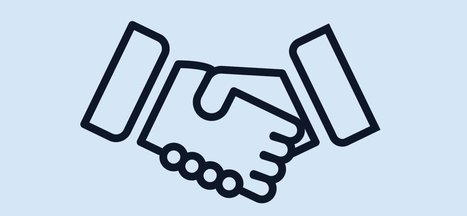 Your new post is loading...
 Your new post is loading...
5 Reasons to Use MicroLearning
MicroLearning is a form of learning that delivers key concepts in as short an amount of time as possible. It is a short, sharp, just-in-time snippet. I like to think of microLearning as 'short enough to watch standing up on the job'. It's when you need a quick tip, brush up on a specific skill or have a moment to learn about new product between customers. What are the 5 advantages of microLearning? 1. Timely Learning. The greatest advantage of microLearning is time. Imagine a manager racing through their day. They have a performance management meeting with an employee but have not had the time to read up on the correct procedure to follow. Or a railway engineer arriving at a broken down train and the broken axle is something he hasn't unbolted for 12 months. Neither of them have the time to scroll through three layers on the company's Intranet, find the LMS, log on and watch the 20-minute module. What they want is to go to their phone, open an App, and BAM! There is the 3-minute microLearning video. It's all about timely learning. 2. Speed to Market. One of our clients is a global Japanese car manufacturer. They require an eLearning module for every new model released. They don't have months to plan for product training. They need learning NOW! What companies require is microLearning with rapid development that matches their timeline for product delivery. 3. Expiry Date Learning's expiry date is faster than ever. It used to be that a learning program would last a few years before it needs refreshing but with changing products, people and systems, learning is being discarded faster and needs to be produced cheaply, yet with quality. MicroLearning is a cost effective and fast way to develop training content, making it a win/win for the companies and the learners. 4. Pictures are powerful Around 70% of millennials visit YouTube monthly. It is a large part of their life so it seems obvious that we should adapt learning to what they are familiar with. When millennials need to learn something, they watch a 2 minute YouTube video. Research teaches us that if you hear something, after 3 days, you would have only retained 10% of what you learnt. If you then add a picture to that, retention increases to 65% - that's 6 times better! Using video in MicroLearning makes it stick. Our brain links what we hear to a picture and retention is greater. 5. Mobile One of our Pharma clients is investing in Asia. The people they are training in Asia have limited access to computers, but they all have smartphones. How do they train them? MicroLearning. They make it engaging, enjoyable, entertaining and most of all mobile compatible. The training is mobile, so that they can watch it standing up on the job, or sitting on the bus or train. MicroLearning is certainly leading the way in creating new and exciting learning content, whilst making the process easier for both the companies and their employees. Send me a message if you'd like to find out more on our microLearning offering and what we can offer. Chris Gaborit is managing director of The Learning Factor, an eLearning company who loves technology linked to learning. Follow him here on Linkedin, on Twitter @droneservicesAU and Instagram @idronefoto
Via The Learning Factor
You’ve probably been taught that giving compliments build relationships. In the self-help classic How to Win Friends and Influence People, Dale Carnegie stressed the importance of “giving sincere and honest appreciation” to others in life and work. He’s not wrong, but the thing is that showing real appreciation is difficult to do. How many times has someone given you a “compliment” and you just know they’re trying to get something from you? Compliments can easily veer into flattery and feel insincere, leaving the recipient wondering about the giver’s hidden agenda. Here’s what it takes to avoid all that–it’s easier than you think.
Via The Learning Factor
Learning new things is an important part of career growth, and 87% of millennials say professional development opportunities factor into their job decisions, according to Gallup. Acquiring too much information, however, can be a problem, putting your career at risk of becoming stagnant, says Dom Price, work futurist-in-chief and head of R&D at the software development firm Atlassian in Sydney, Australia. “In the digital world, we’re privy to an abundance of knowledge,” he says. “We believe getting smart means knowing more, but in fact, it is not. We’re not practicing what we know. The acquisition of knowledge is dangerous when you don’t practice it.” In order to succeed, Price argues that you need to understand the importance of unlearning—identifying the things you know that you don’t have time to nurture, and then letting some of them go.
Via The Learning Factor
Of all the things you learned in school, chances are the right way to learn wasn’t one of them. To make it through academic life, most of us opt for what psychologists call “massed practice,” better known as cramming: It’s Monday and your test is Friday, so you save studying for the night before. One four-hour session can nab you a passing grade, so why not? Well, because that’s not how your brain likes to absorb information. You might remember enough to pass your exam the next day, but just a week or two later and the details will already be fuzzy, if not gone completely. Here’s how to do better.
Via The Learning Factor
If you’re constantly frazzled on the job, logging super-long hours with little to show for it at the end of the day, chances are good that you’re mismanaging your time. But the good news is it’s easy (enough) to reorganize your schedule and get back on a successful track, stat! “There’s a lot coming at us: mail–and [all kinds of] paper in general–emails, texts, phone calls, bosses calling for help, deadlines, projects–it doesn’t stop,” points out Felice Cohen, organizer and author of 90 Lessons for Living Large in 90 Square Feet (or More). No wonder so many of us get so behind and feel so exasperated. But it doesn’t have to stay that way. The answer isn’t to do more. “Not everyone can multitask, and most of us who do probably shouldn’t,” says Cohen. Rather, the answer is to do what you do smarter. And here’s how.
Via The Learning Factor
Doctors use the “universal pain assessment tool” to measure how uncomfortable their patients are. It’s a simple mechanism made up of smiley (and sad) faces. At one end of the spectrum is “pain free,” and on the other is “unimaginable, unspeakable pain,” with “tolerable” and “utterly horrible” falling in between. It’s not terribly scientific, but the tool helps medical professionals download your pain data from a little chip in your brain, so to speak, making it one of the best and fastest assessments at doctors’ disposal. It’s not just pain that’s difficult to quantify–so is the human experience generally. But researchers have devised tools to study other mushy concepts, too, including creativity. And in the process we’ve learned there’s at least one thing that tends to nudge people into measurably more creative thinking: boredom.
Via The Learning Factor, Bobby Dillard
Some people just seem to bounce back from whatever life throws at them. Whether it’s illness, loss, or tragedy, they do the tough work of picking themselves up, dusting themselves off, and carrying on—even when it seems impossible. If you’ve ever thought, “I could never do that” when looking at one of these apparent “superheroes,” don’t be so sure. It’s actually possible to build resilience to make yourself better able to bounce back from even the most difficult times. “It’s the ability to get back in the game after you’ve had some sort of failure. And indeed, we can learn to become more resilient,” says social scientist and leadership expert Frank Niles, PhD. Niles says there are a number of science-backed areas people can address to help them be more resilient. Here are some ways you can shore up your “resilience bunker” to better prepare for when tough times strike.
Via The Learning Factor
It’s no understatement that digital mediums have taken over every aspect of our lives. We check what our friends are doing on the glowing screens in our hands, read books on dedicated e-readers, and communicate with customers and clients primarily through email. Yet for all the benefits digital mediums have provided us, there has been a growing body of evidence over the past several years that the brain prefers analog mediums. Studies have shown that taking notes by longhand will help you remember important meeting points better than tapping notes out on your laptop or smartphone. The reason for that could be that “writing stimulates an area of the brain called the RAS (reticular activating system), which filters and brings clarity to the fore the information we’re focusing on,” according to Maud Purcell, a psychotherapist and journaling expert. If that’s the case, and the analog pen really is mightier than the phone, it’s no wonder some of my colleagues have ditched smartphones for paper planners.
Via The Learning Factor
1. Learn something new, even if it's stressful: Mastering a new skill means more stress now but more happiness later. If you are willing to push through a bit of added stress in the short term, you can experience huge gains in happiness for the long term. So learn a new skill. Though you'll take on a bit more stress, research shows you'll be happier on an hourly, daily, and long-term basis. The gains from this investment in time and energy were documented in a 2009 study published in the Journal of Happiness Studies. Participants who spent time on activities that increased their competency, met their need for autonomy, or helped them connect with others reported decreased happiness in the moment yet increased happiness on an hourly and daily basis. The key, according to the study, is to choose the right new skill to master, challenge to undertake, or opportunity to get out of your comfort zone. The greatest increases in happiness come from learning a skill you choose, rather than one you think you should or feel forced to learn.
Via The Learning Factor
Worrying about deadlines, work flow or employee issues is natural for people working in the business world. Stress happens. You have options, though, on how you deal with stress. Sometimes, taking a moment to recenter yourself is all you need to do: By putting things into perspective, you can find the grit to keep going. That’s not always the best course of action, though. If you find that a particular task or job regularly leaves you feeling overwhelmed, drained or quietly angry, you may want to rethink how you approach the work or even consider whether you’d be better suited for a different sort of job or different company.
Via The Learning Factor, Bobby Dillard
No matter where you are in your career, it’s only natural to occasionally feel as though there are things you’d like to change. But it’s one thing to say you want to make a change and quite another to actually make it happen. In order to make serious steps toward reinventing yourself, you need to first commit to it and then take action to make those changes a reality. Here are twelve ways you can reinvent yourself at work and in your personal life, backed by science.
Via The Learning Factor
Tell someone 'I'm sick' or 'I'm tired' and you're not really giving them much information. How sick? How tired? Do you have a mild cold or a dread disease? Are you a new parent who hasn't slept in months or did you just enjoy the party last night a little too much? Burnout is the same. It comes in different degrees, from your common 'I can't wait for happy hour' variety, to far more serious 'I need to take a six-month sabbatical and re-evaluate my life' burnout. The appropriate response for different stages is very different. So how do you know how burnt out you are exactly? Science, apparently, can help. Recently 99U's Hamza Khan dug up a classic Scientific American article (subscription required) that describes a 12-stage model of burnout developed by psychologists Herbert Freudenberger and Gail North. Here are the stages the scientists outline:
Via The Learning Factor
It’s hard to get anything done with all of the push notifications pulling us into other directions. You can find something else to do or think about at any given moment. But maybe the distractions aren’t the problem. Maybe it’s your willingness to be distracted that needs to be examined. “Distractions are by-products of a problem,” says Kyle Cease, author of I Hope I Screw This Up: How Falling In Love With Your Fears Can Change the World. “Something outside of you is pulling you away from yourself or a goal. But the distraction is actually on the inside, and what’s going on outside matches what’s going on inside.” We invite distractions as a way to handle three internal struggles, says Cease.
Via The Learning Factor
|
You’ve probably experienced the frustration of being distracted at work. Perhaps you were pulled into a never-ending Slack discussion, and when it finally ended you struggled to focus on the task you were working on. Or a coworker criticized you, and now you can’t stop replaying his comments in your head. It’s totally normal to lose focus after a period of time (which is why you should be taking regular breaks). But if you find yourself easily distracted throughout the day, you might want to consider tweaking some of your morning habits. They probably won’t eliminate all distractions, but you’ll at least start your workday strong building a good foundation for the rest of the day.
Via The Learning Factor
What do you really need to get ahead at work? I get asked this all the time. The answer varies depending on the person, their goals, and my mood, but there’s one answer I’ll never give: “Work hard.” That’s not an oversight or a misstep. It’s very intentional. Whenever I hear some public speaker or Silicon Valley personality talk about how it just takes hard work to really succeed, I can’t help but roll my eyes a little. I’m sick of hearing people talk about working hard, keeping busy, putting their head down, etc. We’ve become too preoccupied with “the grind,” and it’s actually bringing us down.
Via The Learning Factor
Be honest: How is your progress so far on those New Year’s resolutions you lined up just a few weeks ago? As January wears on and the cold, dreary weather continues for many of us, sticking with your resolutions can quickly start to seem more challenging than you’d expected–and sometimes completely impossible. If you’ve made and broken countless resolutions in the past and are already struggling this year, don’t give up hope just yet. It simply might be time to take a different approach to your resolutions. Understanding a little bit more about how the brain reacts to rewards and motivations could make the difference between forming a new habit for life and giving into temptation or laziness after a few weeks.
Via The Learning Factor
It’s that time of year when many of us get motivated to make ourselves better—healthier, wealthier, wiser, or just different—in the new year. Roughly six in 10 of us make New Year’s resolutions, according to a 2016 Harris poll. But following through on those goals isn’t easy. Roughly half of those who are earnestly vowing to make improvements in 2018 are likely dusting off the same list they had last year. So if you want to actually accomplish those goals—or at least make a dent in them—by this time next year, use these five approaches.
Via The Learning Factor
What do people want out of work? More than money, more than benefits, much more than job security, a recent survey says, they want to be treated with respect. If that sounds like you, how can you increase the respect you get each day at work? It turns out that there are specific habits you can cultivate that allow you to train the people you work with to treat you respectfully each day. Here are 33 of these proven habits that can help, if you're willing to stick with them. Implement a few, take inspiration from the others, and you'll likely see dividends quickly.
Via The Learning Factor
Companies want to be profitable and maximize their performance and impact both in the world and within their industry. With that said, accomplishing those feats starts with cultivating a culture to allow those things to happen which starts with a priority on employee well-being. Culture is important -- it affects engagement, mindset, reputation, recruitment of talent, and well being. When looking to cultivate a healthy and high performing culture, start by emphasizing these six points:
Via The Learning Factor, Mark E. Deschaine, PhD, Bobby Dillard
We might spend days, months, or even years trying to figure someone out. Is he who he says he is? Should I trust her? The wheels in our head spin as we think of all the variables and how they'll play out. And still, we keep hearing that we should just listen to our instincts. Complicated questions, simple answer. What should we do, and where did this whole idea of the gut instinct come from, anyway? Intuition isn't some magical, mysterious quality that we carry with us. It actually comes from the knowledge and past experiences that we all carry. Even if we're unable to explain why we feel the way we do, there's a logical explanation behind our gut feelings. Whenever you encounter anything new, the unconscious side of your brain is constantly making assessments. It takes in certain cues, such as a smile or parts of a story, and then matches it with something similar in our database of memories to come up with a conclusion. Meanwhile, our conscious side remains unaware of this rapid process taking place.
Via The Learning Factor
Find it hard to advocate for yourself? You’re not alone. The personality trait that psychologists call “agreeableness” describes how motivated you are to get along with other people. If you’re highly agreeable, that motivation can sometimes prevent you from sticking up for your own interests. Anytime you ask for something at work, you run the risk that you’ll be told “no”–and possibly aggravate the person you’re asking. As a result, agreeable people may be put off from asking in the first place. This can be a problem, because research suggests that agreeable people tend to make less money than disagreeable people (even accounting for the fact that disagreeable people lose their jobs more often). And in leadership roles, agreeable people may not be as good at getting their teams all the resources they need. So what can you do to be more assertive even when it just isn’t in your personality to do so? Here are a few tips.
Via The Learning Factor
As entrepreneurs, we often work late into the night, only to roll out of bed the next morning, picking up where we left off. One day bleeds into the next, making it seem as if we're always doing, doing, doing and searching for new and novel ways to do more. The truth is, your desire to do more and get more done will lead you not toward greater productivity, but toward burnout, if you don't take time each day to check in with yourself, and set your intention for how you want your day to proceed. Abraham Lincoln is credited with saying, "If I had six hours to cut down a tree, I'd spend the first four sharpening the axe." There is no evidence to suggest that Lincoln actually said this, but the point is not lost on us. How we prepare to do the task before us determines our success.
Via The Learning Factor
Millennials are starting to take control in the workplace. There are now more than 75 million millennials in the workforce, more than baby boomers (just shy of 75 million) and Gen Xers (66 million). Now entering their late 20s and early 30s, the oldest members of the generation are starting to take more leadership positions in major organizations. Despite the fact that millennials are sporting one of the lowest rates of entrepreneurship in 25 years, 60% see themselves as entrepreneurs, and 90% recognize entrepreneurship as a mindset. Combined with their natural tendencies toward independent thought and mild to moderate anti-establishment vibes, this is making millennials a strong force of direction and leadership—and an even stronger one to come in the next several years.
Via The Learning Factor
Let’s face it: Negative feedback on your job performance can be a drag. Who likes to be told that their work could use improvement? Research published in the Harvard Business Review provides some interesting insight into receiving and giving such feedback. While managers by and large avoided giving negative feedback or praise, employees craved it. And they weren’t looking for platitudes, either—57% wanted corrective feedback versus 43% who wanted praise. Seventy-two percent said that corrective feedback could improve their job performance. Still, it’s one thing to think about that in theory—and another to hear from your manager, “We need to talk about your performance . . .” If you do find yourself on the receiving end of negative feedback or criticism, here’s how to cope.
Via The Learning Factor
We’ve all had those days: You’re under pressure to get things done, but you can’t seem to accomplish anything. There is still hope. Here are a dozen strategies you can put to work immediately to help you salvage your day and get more done.
Via The Learning Factor
|




 Your new post is loading...
Your new post is loading...



















































That leader channel Im looking to deliver is closer than I think ... Micro learning is a key feature to set up and reinforce your core skills ...make them handy for associates to get to and keep them short... very short.